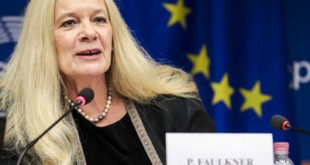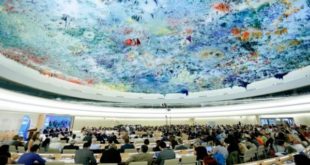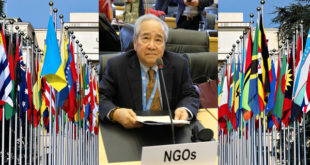
Opening Remarks
Hudson Institute, Center for Religious Freedom
September 12, 2016
Distinguished Guests,
Dear Friends, and for my Compatriots may I say
Kính bạch Chư Tôn đức, kính chào Quý đồng bào, đồng hương
I am very happy to welcome you to this extraordinary Conference today. For me, it really is an extraordinary event. Firstly, because it is held in this wonderful building, thanks to the co-sponsorship of the Hudson Institute’s Center for Religious Freedom and its Director Nina Shea. Secondly, because we have two extraordinary panels of speakers, from top level diplomats and acedemia such as Elliott Abrams, Commissioner Kristina Arriaga and Nina Shea, to experts and direct victims of persecution from religious communities in Vietnam. Our participants are also extraordinary, for many have travelled very far, from Canada, California, Texas, even Hawaii to be here today. They have come at their own costs, and in many cases, I know, at great sacrifice. I am very moved by this gesture of solidarity, and I thank you, one and all.
The presence of two of our speakers has a deep personal meaning for me, for our paths have crossed often in the combat for democracy, religious freedom and human rights in Vietnam: they are Mr. Elliott Abrams and Miss Nina Shea.
In 1985, Elliott Abrams was U.S. Assistant Secretary of State for Human Rights. It was the 10th Anniversary of the Fall of Saigon. Whilst the Communist government was staging huge celebrations in Hanoi, I decided to celebrate in my own way, by filing a Complaint at the United Nations against Hanoi for gross violations of human rights. The complaint was a 500-page indictment of the regime’s repression, with the very first map of re-education camps in which over 2 million people were detained. Elliott Abrams supported our Complaint, and helped us break the silence on Vietnam at a time when the American media was reluctant to admit that the Vietnam War was not over. Indeed, ten years after the withdrawal of US troops, Hanoi’s Communists were still waging a war against the people of Vietnam.
Nina Shea was head of the Puebla Institute here in Washington when we first met. In the early 1990s, when it was politically incorrect to criticize communist states such as China and Vietnam, Nina was amongst the very first to document and denounce systematic religious persecution in these two countries. Nina is Roman Catholic, but her work has always been ecumenical, and she campaigns tirelessly to defend the right to religious freedom for all. I am a Buddhist, and I was very moved to read her description of Buddhism in Vietnam as (I quote) “a faith that decades and even centuries of repressive policies have not been able to crush”.
Both Elliott and Nina played a vital role in making religious freedom a component of US foreign policy, with the adoption of the International Religious Freedom Act in 1998. Inspired by this landmark law, the European Union has adopted Guidelines for the protection and promotion of religious freedom and recently appointed a Special Envoy for Freedom of Religion and Belief outside the EU.
Yet whilst democracies are crafting policies to advance religious freedom, Vietnam seeks to use the law to prevent rather than protect this right.
Very soon, Vietnam will adopt a new Law on Religion and Belief which will legalize instrusive state intereference into religious affairs and a draconian system of registration and control. Organizations such as the Unified Buddhist Church of Vietnam, Montagnard Christians or Khmer Krom Buddhists who cannot, or choose not to register with the state, will be virtually outlawed. This contradicts the very principles of religious freedom, for as UN Special Rapporteur on Freedom of Religion or Belief, Dr Heiner Bielefeldt said, “registration should be an offer by the State, but not a compulsory legal requirement”.
Religious freedom, both as a human right and a vector of regional and global security is the theme of our Conference today. I believe – and I will conclude my remarks with this thought – that the right to religious freedom is widely misunderstood. It is wrongly perceived as right that concerns only those who believe in God. In fact, the United Nations’ definition is much wider, and it concerns us all. Freedom of thought, conscience, religion and belief is truly the mother of all freedoms – for it is the very core of one’s identity. It shapes every aspect of your thinking and acting, who you are and how you behave within society. Here today, we will explore ways to promote and protect this right, to develop a civic culture of tolerance and compassion, and help lay the foundations of a lasting peace in this region and in the world.
On this ambitious note, I thank you all again, and hand the floor to Nina Shea, who will moderate the first panel today.
Võ Văn Ái
President
Vietnam Committee on Human Rights
 Quê Me Quê Me: Action for democracy in Vietnam & Vietnam Committee on Human Rights
Quê Me Quê Me: Action for democracy in Vietnam & Vietnam Committee on Human Rights



